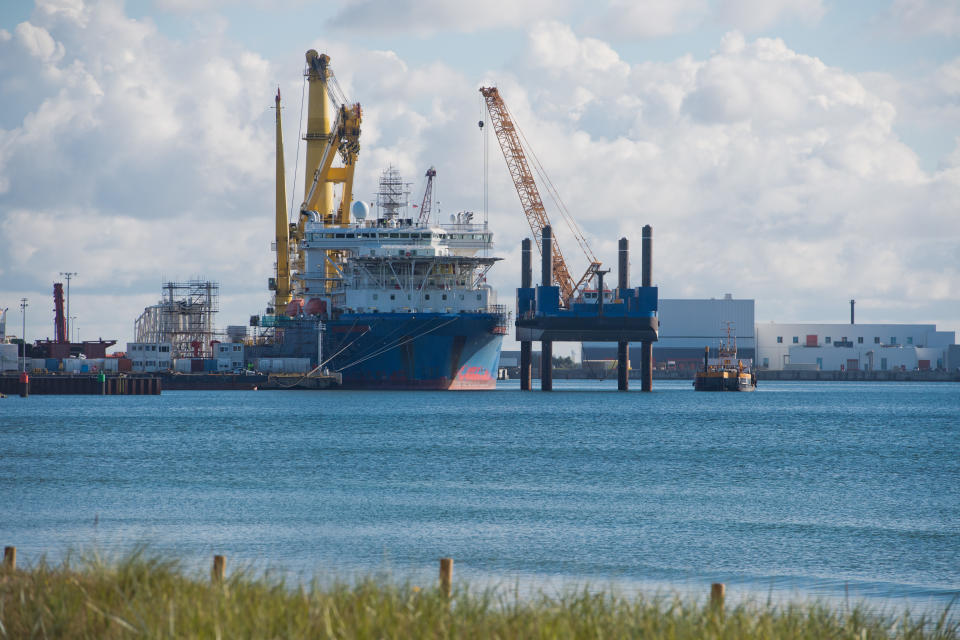Calls grow for Germany to halt Nord Stream 2 pipeline after Putin opponent poisoned

The Nord Stream 2 natural gas pipeline from Russia to the north coast of Germany is in the political crosshairs again this week, after Berlin doctors confirmed that Alexei Navalny, an outspoken critic of Russia’s Vladimir Putin, was poisoned by the banned nerve agent Novichok.
Navalny was airlifted to Berlin after becoming sick on a flight in Siberia in August, and is currently in intensive care at the Charité Hospital.
During her annual summer press conference last week, German chancellor Angela Merkel ruled out halting work on the North Stream 2 over the poisoning. "Our opinion is that Nord Stream 2 should be completed,” Merkel said. “I don't think it is appropriate to link this business-operated project with the Navalny question."
But pressure is growing on Merkel to take a stand against the Kremlin by stopping the project, after her press conference this week where she stated there was “unequivocal evidence” the Russian activist had been poisoned with a Novichok nerve agent.
She condemned the attack, saying it was “attempted murder by poison of one of Russia's leading opposition members” and “an attempt to silence him.”
However, the chancellor’s condemnation and her call for the Russian government to explain itself have been criticised by lawmakers and the German media as inadequate. Bild newspaper wrote this week that “as long as it [the German government] acts in collusion with Putin on the Nord Stream 2 pipeline, all these declarations are just empty words”.
Norbert Röttgen, who is running as a Christian Democrat chancellor candidate to replace Merkel in the 2021 election, said if Germany were to complete the pipeline with Russia it would in effect encourage Putin’s “inhuman and contemptuous politics,” adding that “the EU should jointly decide to stop Nord Stream 2.”
Manfred Weber, chairman of the EPP group in the European Parliament told Spiegel that "the end of Nord Stream 2 can no longer be ruled out.”

“This is an assassination attempt, directed from the Kremlin, against the opposition politician Alexei Navalny,” Annalena Baerbock, chairwoman of the Greens Party told Spiegel. “A clear response from the federal government would be to stop the Nord Stream 2 project immediately.”
READ MORE: Fresh US threats to German port over Russian gas pipeline spark anger in Berlin
The €10bn (£9bn, $12bn) pipeline, running from Narva Bay in Russia to Lubmin in Mecklenburg-Vorpommern in Germany, is about 160km (99 miles) out of a total of 1,200km away from being finished.
Russian state-energy giant Gazprom is the main owner of the pipeline, with co-financing companies including Wintershall, Uniper (UN01.DE), and Royal Dutch Shell (RDS-A).
The controversial pipeline was already under threat from the US. President Donald Trump has long opposed the project that he said would make Germany, and Western Europe, too reliant on energy from Russia.
Germany expressed its annoyance at the US in August after a Republican senators sent a threatening letter to Fährhafen Sassnitz, the company that operates the port of Mukran on the island of Rügen in the Baltic Sea, and is involved in the pipeline.
The senators accused the port company of “knowingly providing significant goods, services, and support" for Russian and German pipeline-construction vessels and ordered it to cease these activities or face "crushing legal and economic sanctions.”
US secretary of state Mike Pompeo also warned in July that Washington would punish companies and investors in the natural gas pipeline with sanctions under a revision to the US’s 2017 CAATSA (Countering America’s Adversaries through Sanctions) law.
READ MORE: US threatens sanctions on Nord Stream 2 pipeline investors
Energy company Uniper noted in its first-half report in August that “with the US intensifying their efforts on targeted sanctions against the Nord Stream 2 project, the probability of a delay or even non-completion of the pipeline is increasing.”
The EU is also mulling sanctions, according to its foreign policy chief Josep Borrell. However, Putin denies any involvement in Navalny’s poisoning, echoing his former denial of any link to the poisoning of former spy Sergei Skripal and his daughter by Novichok in the UK in 2018.

 Yahoo Finance
Yahoo Finance 